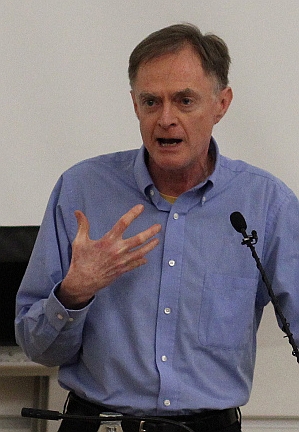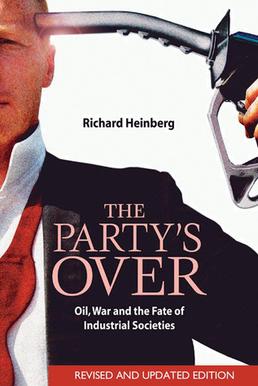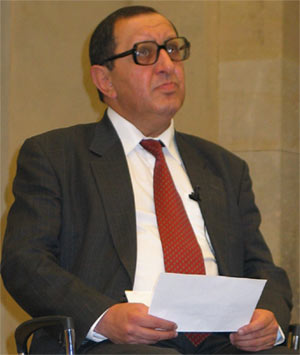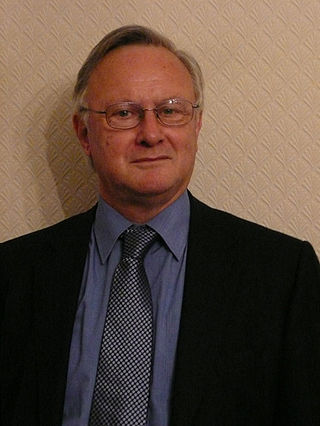
Peak oil is the hypothetical point in time when the maximum rate of global oil production is reached, after which it is argued that production will begin an irreversible decline. It is related to the distinct concept of oil depletion; while global petroleum reserves are finite, the limiting factor is not whether the oil exists but whether it can be extracted economically at a given price. A secular decline in oil extraction could be caused both by depletion of accessible reserves and by reductions in demand that reduce the price relative to the cost of extraction, as might be induced to reduce carbon emissions.

James Howard Kunstler is an American author, social critic, public speaker, and blogger. He is best known for his books The Geography of Nowhere (1994), a history of American suburbia and urban development, The Long Emergency (2005), and Too Much Magic (2012). In The Long Emergency he imagines peak oil and oil depletion resulting in the end of industrialized society, forcing Americans to live in smaller-scale, localized, agrarian communities. In World Made by Hand he branches into a speculative fiction depiction of this future world.

Colin J. Campbell was a British petroleum geologist who predicted that oil production would peak by 2007. He claimed the consequences of this are uncertain but drastic, due to the world's dependency on fossil fuels for the vast majority of its energy. His theories have received wide attention but are disputed and have not significantly changed governmental energy policies at this time. To deal with declining global oil production, he proposed the Rimini protocol.

Richard William Heinberg is an American journalist and educator who has written extensively on energy, economic, and ecological issues, including oil depletion. He is the author of 14 books, and presently serves as the senior fellow at the Post Carbon Institute.

The Party’s Over: Oil, War and the Fate of Industrial Societies, by Richard Heinberg, is an introduction to the concept of peak oil and petroleum depletion.
Julian Darley is a filmmaker, writer and speaker on policy responses to global environmental degradation. He is the author of the book High Noon for Natural Gas, and the founder of Global Public Media, Post Carbon Institute and Mysterious Movies Ltd. He lives in London, England.

Matthew Roy Simmons was founder and chairman emeritus of Simmons & Company International, and was a prominent figure in the field of peak oil. Simmons was motivated by the 1973 energy crisis to create an investment banking firm catering to oil companies. He served as an energy adviser to U.S. President George W. Bush and was a member of the National Petroleum Council and the Council on Foreign Relations.
Oil depletion is the decline in oil production of a well, oil field, or geographic area. The Hubbert peak theory makes predictions of production rates based on prior discovery rates and anticipated production rates. Hubbert curves predict that the production curves of non-renewing resources approximate a bell curve. Thus, according to this theory, when the peak of production is passed, production rates enter an irreversible decline.
The Rimini Protocol is a proposal made by the geologist Colin Campbell. It is intended to stabilise oil prices and minimise the effects of peak oil. It is named after the XXIX. Annual Conference The Economics of the Noble Path: Fraternal Rights, the Convival Society, Fair Shares for All of the Pio Manzù International Research Centre in Rimini, Italy on 18-20 October 2003, where Campbell presented his idea of an oil depletion protocol. A few months later, he published together with Kjell Aleklett, the head of the Uppsala Hydrocarbon Depletion Study Group, a slightly refined text under the name Uppsala Protocol.
Barrie Wallace Zwicker is a Canadian alternative media journalist, documentary producer, and political activist.

Ali Morteza Samsam Bakhtiari was an Iranian author and oil expert employed by the National Iranian Oil Company (NIOC). He held a number of senior positions with this organization beginning in 1971. He was also an adviser to the Oil Depletion Analysis Centre.

Chris Skrebowski is a well-known commentator on the oil industry and an expert on global oil supply. He is the founding Director of Peak Oil Consulting and consulting editor for Petroleum Review, the magazine of the UK Energy Institute. Skrebowski is also a founding member of the Association for the Study of Peak Oil and Gas (ASPO) and sits on the board of the Oil Depletion Analysis Centre (ODAC). He is a Fellow of the Energy Institute and advises the All Party Parliamentary Group on Peak Oil and Gas (APPGOPO).
Dale Allen Pfeiffer is a geologist and writer from Michigan, U.S. who investigated and wrote about energy depletion and potential future resource wars. He also wrote about class war, sustainability, direct action and the environment. He is also an anarchist activist and a member of the Industrial Workers of the World. In 1999, he was one of the organizers of a hunger strike to provide medical care for the incarcerated Leonard Peltier.

Crude Impact is a 2006 film written and directed by James Jandak Wood. It is a documentary about the effect of fossil fuels on issues such as global warming, the environmental crisis, society and the questionable practices of oil companies.

How to Boil a Frog is a 2010 Canadian eco-comedy documentary film written and directed by Jon Cooksey to show the consequences of too many people using up Earth resources and suggesting five ways that the filmmakers say people can save habitability on the Earth while improving their own lives at the same time.

Peak oil is the point at which oil production, sometimes including unconventional oil sources, hits its maximum. Predicting the timing of peak oil involves estimation of future production from existing oil fields as well as future discoveries. The most influential production model is Hubbert peak theory, first proposed in the 1950s. The effect of peak oil on the world economy remains controversial.
The Oil Factor, alternatively known as Behind the War on Terror, is a 2004 movie written and directed by Gerard Ungerman and Audrey Brohy, narrated by Ed Asner. The documentary analyzes the development of some global events since the beginning of the century from the perspective of oil and oil-abundant regions.
Post Carbon Institute (PCI) is a think tank which provides information and analysis on climate change, energy scarcity, and other issues related to sustainability and long term community resilience. Its Fellows specialize in various fields related to the organization's mission, such as fossil fuels, renewable energy, food, water, and population. Post Carbon is incorporated as a 501(c)3 non-profit organization and is based in Corvallis, Oregon, United States.

Michael Craig Ruppert was an American writer and musician, Los Angeles Police Department officer, investigative journalist, political activist, and peak oil awareness advocate known for his 2004 book Crossing The Rubicon: The Decline of the American Empire at the End of the Age of Oil.
Escape from Suburbia: Beyond the American Dream is a 2007 Canadian documentary film written and directed by Gregory Greene, as a sequel to Greene's film The End of Suburbia, and set to address what is termed "the upcoming energy crisis". Through interviews with individuals, Gregory Greene outlines potential solutions to the coming energy crisis.












